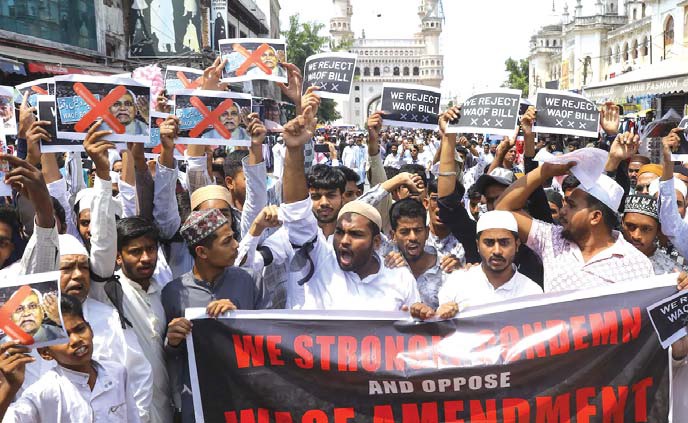- Home
- 2
AM I INDIAN ENOUGH? - BY DEREK O'BRIEN
Young Bites. Dated: 4/22/2025 11:52:37 AM

DEREK O’BRIEN Many of us have never had to ask ourselves this question. And maybe that's the privilege we need to confront first. Because for millions of Indians, especially those from our minority and marginalised communities, this is not a rhetorical question. It's a lived reality. It is a quiet burden. It is a deep suspicion cast on their belonging. Their being. Every legislation. Every policy. And now, with the Waqf Amendment Bill, 2024, ironically named “Umeed”. Is hope being turned into hopelessness? Are we making legislation for greater good or for cynical pigeon holing? All this is not just about land or law. It is about dignity. About whether our Constitution still holds meaning for all of us or only for some of us. The Bill introduces a five-year requirement of practicing Islam before someone can create a Waqf. This is not only arbitrary but also deeply discriminatory. No such restriction exists for other religious endowments (Violation of Right to Equality). A Hindu, Christian, or Sikh can donate property to their religious institutions at any time. Why and how should Muslims alone prove the longevity of their faith before making a charitable endowment? Another serious issue with the Bill is the removal of “Waqf by user”, a concept that allows property that has been used for religious or charitable purposes for a long time to be considered Waqf even without formal documentation. Similar concepts exist and are protected under laws governing Hindu temples and Christian institutions. For example, the Tamil Nadu Hindu Religious and Charitable Endowments Act, 1959 recognises temples that have functioned for long periods, even in the absence of formal deeds. By stripping Muslim institutions of this same recognition, the government is creating a legal hierarchy among religious communities. This is a clear violation of Article 14 of the Constitution, which guarantees equality before the law. Waqf-alal-aulad, created through a written deed, permanently dedicates property for charitable purposes while initially benefiting family members. It is not inheritable. The government's move to let descendants claim ownership contradicts the core principle of Waqf and creates confusion in inheritance law, especially affecting women's rights already protected under Muslim law. Such interference undermines both legal clarity and religious tradition. The Bill changes the composition of the Central Waqf Council and State Waqf Boards to allow a majority of non-Muslim members. For instance, up to 12 of 22 members of the Central Waqf Council can now be non- Muslims. This is unprecedented. Waqf Boards are meant to administer Islamic charitable endowments. Placing control of these institutions in the hands of individuals who do not belong to the faith defeats the purpose of Articles 25 and 26, which ensure that religious denominations manage their own institutions. Moreover, the Bill shifts the selection process from election to nomination, giving the government undue power to appoint board members. This transformation of Waqf Boards into government-controlled bodies undermines their autonomy and invites majoritarian influence over minority religious affairs. By assigning power to a Designated Officer (a government employee) to declare whether a property is Waqf or not, the Bill empowers the state to act as judge, jury, and plaintiff. This violates the principle of natural justice: no one should be a judge in their own cause. Further, by removing the finality of Waqf Tribunal decisions, it opens up endless litigation, weakening Waqf Boards and creating bureaucratic hurdles. It undermines Article 25-26: Freedom to manage religious affairs. A particularly alarming change is the application of the Limitation Act, 1963, to Waqf properties. Previously, Waqf land had certain protections, recognising that religious endowments are perpetual and cannot be claimed through adverse possession. The new amendment removes these protections, allowing those who have illegally occupied Waqf land to potentially gain legal ownership if they hold it long enough. This provision also reduces the penalty for encroachment from imprisonment to a mere fine and makes the offence bailable, making it easier for powerful entities to grab Waqf land without serious consequences. This erodes the very idea of a Waqf being a “permanent” charitable dedication. Land is a State Subject under List II of the Seventh Schedule of the Constitution. Tomorrow, what stops the Union Government from taking over Hindu temple boards? Or churchmanaged lands? This isn't about reform. This is about control. And such overreach is a direct assault on Indian federalism. The Waqf Act, 2025, is currently under scrutiny in the Supreme Court due to multiple petitions challenging its constitutional validity. In yesterday's hearing, the Union government was granted seven days to file its response. The Waqf Amendment Bill is not merely a legislative proposal. It is a mirror. And what we see in it should disturb all of us - whether Hindu, Muslim, Christian, Sikh, any religion or none. Because if rights can be rewritten for one, they can be rewritten for all. This Bill violates equality. It violates personal autonomy. It violates federalism. And, more than anything, it violates the idea that our great nation is built on. Who gets to decide how much is enough? Enough to practice our faith without suspicion? Enough to exist without having to prove our belonging every single day? The Constitution does not ask how much we belong. It guarantees that we do. (Courtesy: NDTV/ (Derek O'Brien, MP, leads the Trinamool Congress in the Rajya Sabha)Disclaimer: These are the personal opinions of the author